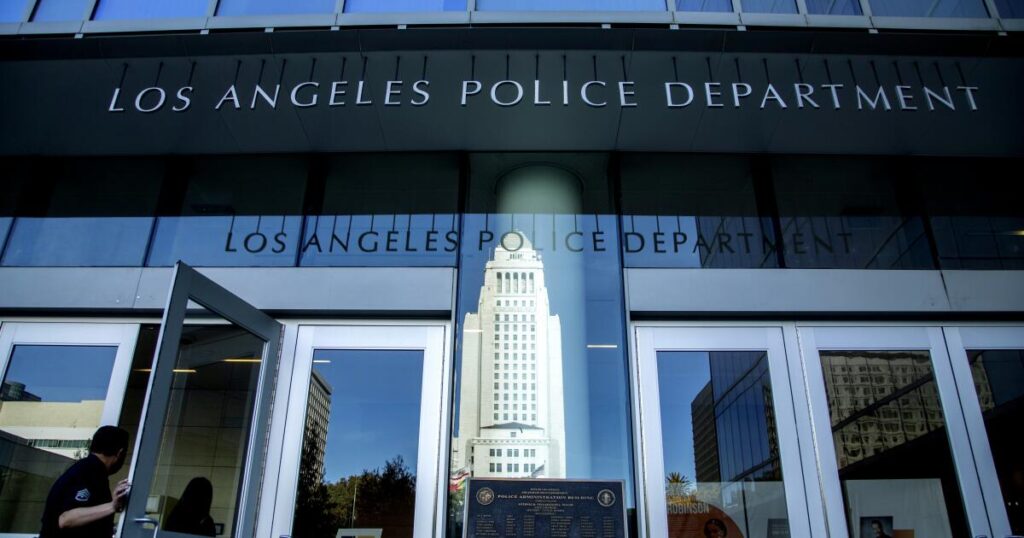
A divided Los Angeles City Council chose not to override Mayor Karen Bass’ first veto of her administration, effectively killing a ballot initiative that would have let the police chief fire officers for misconduct.
The City Council needs 10 votes to override a veto issued by Bass two weeks ago. The City Council voted 9-5 to accept the mayor’s veto without objection.
City Councilman Tim McOsker, who spearheaded the push to enact LAPD disciplinary measures on the Nov. 5 vote, expressed disappointment with the outcome, saying city leaders “missed a lot of work on the LAPD’s disciplinary system.” A window of opportunity for reform.” “
McOske joined Bob Blumenfield, Kevin DeLeon, John Lee and Monica Rodriguez in voting against accepting the mayor’s veto without further action.
Councilmember Katie Yaroslavsky welcomed Tuesday’s vote, saying the measure “is not the real systemic reform we need.” She said a veto would allow city leaders to restart the legislative process and give the mayor “an opportunity to enact more substantive reforms.”
Yaroslavsky, who voted to put McOske’s measure on the ballot in June, said she discussed the proposal with attorneys for Bass and the city and now believes it is “problematic.” She criticized a section of the proposal that would allow officers to appeal dismissals as part of a binding arbitration process, saying she believed such a system was too lenient.
“We know that the outcome of the arbitration was not conducive to maintaining the ability to fire this individual,” she said.
City Councilman Hugo Soto Martinez also criticized the concept of binding arbitration and said the measure would limit the types of misconduct that could lead to the police chief’s firing.
He said it would give the LAPD a “two-tier” disciplinary system.
“This is not reform,” Soto-Martinez told his colleagues. “That’s putting lipstick on a pig.”
The proposal, approved by the commission in June, would allow for the outright dismissal of officers found to have engaged in “serious” misconduct, including dishonesty, physical abuse, racial bias and other forms of discrimination, as well as members of law enforcement gangs.
The measure would also realign the composition of the LAPD’s three-member disciplinary panel, known as the Board of Rights, ensuring that one of its members serves as commander.
In his veto letter to the council, Bass said the ballot proposal would leave the LAPD facing a “gap in guidance” and put the agency at risk of “bureaucratic chaos.”
Bass said she met with hundreds of police officers and heard a common theme: the need for “a fairer and clearer disciplinary system.”
“We must bring all parties to the table and we will,” she said in a statement after Tuesday’s vote.
A spokesman for the Los Angeles Police Protective League, which represents about 8,800 police officers, said the union looks forward to working with the mayor and City Council to address the department’s “unfair and biased disciplinary system.”
“We fully support the mayor’s commitment not to make any changes to the current disciplinary system until a comprehensive solution is presented to voters in a subsequent election,” said Tom Saggau, a spokesman for the coalition.
City Council President Paul Krekorian, who is in France for the Olympics, was absent from Tuesday’s meeting, the council’s first since its three-week summer break. On the agenda, he asked that the veto override vote be postponed until August 14.
McOske opposed the idea, noting that the meeting would take place after the deadline for voting on the proposal. He asked colleagues to hold a full discussion on the mayor’s veto on August 6.
The committee deadlocked 7-7 on McOske’s request, with Yaroslavsky, Soto-Martinez, Marquis Harris-Dawson, Eunice Hernandez, and Arthur Hurt, Imelda Padilla and Nicaea Rahman all voted against it.
After the vote, MacOske said he didn’t understand why the Security Council was “so eager to uphold the veto without debate on the first day we had the opportunity to do so.”
“We cannot not do our jobs because we are afraid of losing our jobs,” he said.

